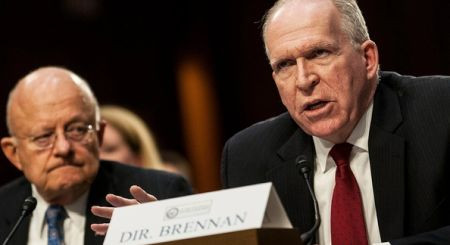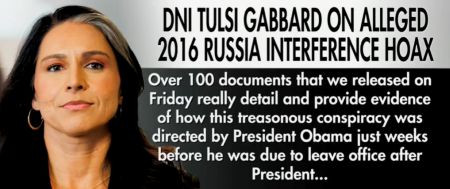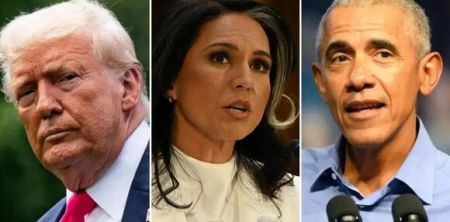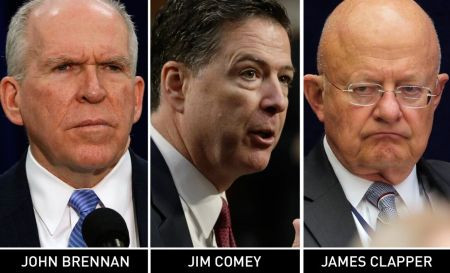The House Report singled out Brennan: He misled not only Elected Officials, but even an Agency of his fellow Intelligence Officers
By Paul Sperry
The Obama intelligence community’s claim that Russian President Vladimir Putin authorized dirty tricks to try and help Donald Trump win the 2016 Election was based on “one scant, unclear, and unverifiable fragment of a sentence from one of the substandard [intelligence] reports,” according to a just-declassified report that had been locked away in a CIA vault.
 Nevertheless, former CIA Director John Brennan ordered agency analysts to use the claim in the Intelligence Community Assessment (ICA) issued during the Obama administration’s final days – even though the ICA itself noted that how the information on Putin’s plans was obtained was “not explicitly clear.”
Nevertheless, former CIA Director John Brennan ordered agency analysts to use the claim in the Intelligence Community Assessment (ICA) issued during the Obama administration’s final days – even though the ICA itself noted that how the information on Putin’s plans was obtained was “not explicitly clear.”A 46-page report by the House of Representatives released Wednesday found that the source of the claim about Putin – reportedly a Russian defector living in Northern Virginia described as “anti-Trump” – merely speculated to Brennan about something he had been told by somebody else: namely, that Putin was “counting on” Trump winning.
ICA participants interpreted the informant’s phrase “counting on” several different ways, the report said. Many National Security Agency and CIA officials viewed “counting on” as meaning the same thing as “expected,” which is much different than the language – Putin “preferred” Trump – Brennan’s five handpicked drafters used in the ICA.
The congressional review determined that “the ICA did not cite any [classified] report where Putin directly indicated helping Trump win was the objective.” (Emphasis added.)
No Corroborating Intelligence
The report then drops a bombshell:
“The ICA judgment on Putin’s thoughts about helping candidate Trump does not stand if [Brennan’s] single interpretation of the fragment [from the tip that Putin was ‘counting on’ Trump winning] is wrong, because there is no other intelligence corroborating it.”
The 2019 report, which investigated the spycraft that went into the highly classified and restricted version of the ICA, found that the Obama intelligence community’s assessment of Russia’s intentions changed sharply after Trump’s surprising victory.
 On the eve of the 2016 election, Brennan sent a “Fusion Cell” memo to President Barack Obama summarizing all the most secret, compartmented intel gathered on Trump and Russia. According to the House report declassified and released by Director of National Intelligence Tulsi Gabbard on Wednesday, that memo “made no mention of Putin ‘aspiring’ for a Trump victory.” Although the Russian defector had shared his thoughts about Putin with Brennan in July, the CIA director’s Nov. 6 memo concluded,
On the eve of the 2016 election, Brennan sent a “Fusion Cell” memo to President Barack Obama summarizing all the most secret, compartmented intel gathered on Trump and Russia. According to the House report declassified and released by Director of National Intelligence Tulsi Gabbard on Wednesday, that memo “made no mention of Putin ‘aspiring’ for a Trump victory.” Although the Russian defector had shared his thoughts about Putin with Brennan in July, the CIA director’s Nov. 6 memo concluded,“Putin expected [Hillary Clinton] to win.”
But then in early December, after Obama ordered a new assessment, Brennan dusted off the informant’s secondhand hearsay – which had been shelved as unreliable.
The CIA director, who had previously worked for Obama in the White House, suddenly insisted it underpin the new conclusion about Putin’s motives.
“The major ‘high confidence’ judgment of the ICA rests on one opinion about a text fragment with uncertain meaning,” the House report found.
The CIA director, who had previously worked for Obama in the White House, suddenly insisted it underpin the new conclusion about Putin’s motives.
“The major ‘high confidence’ judgment of the ICA rests on one opinion about a text fragment with uncertain meaning,” the House report found.
“This text – which would not have been published without [Brennan’s] orders to do so – is cited using only one interpretation of its meaning and without considering alternative interpretations,” in violation of Intelligence Community Directive 203.
Rebuking Brennan
The House Intelligence Committee report, whose chief author was retired Army Col. Derek Harvey, determined from a series of interviews in 2018 and 2019 with CIA analysts at Langley that Brennan ordered drafters to use the specious report from the Russian informer without following analytical standards approved by Obama’s intelligence czar James Clapper in 2015.
The House report singled out Brennan for rebuke, questioning his “character” and “ethics,” while suggesting he misled not only the public but also policymakers, lawmakers, and even many of his fellow intelligence officers.
 Gabbard said Wednesday she has turned the declassified report over to the Justice Department along with a criminal referral on Brennan.
Gabbard said Wednesday she has turned the declassified report over to the Justice Department along with a criminal referral on Brennan. The FBI and DOJ have launched an investigation into Brennan and former FBI Director James Comey for possible perjury.
They are also subjects of a broader conspiracy probe.
Harvey and other investigators spent hundreds of hours inside a highly secure room called a SCIF at CIA Headquarters poring over the raw intelligence materials that supposedly backstopped the ICA’s conclusions. In an exclusive interview with RealClearInvestigations, he said it became clear, after closer inspection, that the raw information the informant provided lacked credibility.
“There really was no evidence that Putin supported Trump,” Harvey said.
Even so, Brennan – as well as Comey, who also handled the informant – pushed to include his tip in the ICA to back the judgment Putin worked to help Trump win the election, all the while concealing their star source’s identity, background, and reliability from most of the participants involved in the crafting of the ICA.
“They knew he was not reliable, and they tried to hide access to him,” Harvey said.
“They knew he had bad sources. This stuff was weak.”
“They knew he had bad sources. This stuff was weak.”
It was so weak that Brennan insisted analysts reference a since-debunked dossier funded by Clinton’s campaign as a bullet point in the main body of the ICA to support the Putin-helped-Trump conclusion.
This judgment was the most radioactive finding in the ICA and laid the foundation for several investigations of Trump and several of his advisers for allegedly “colluding” with Russia.
 A special counsel found no evidence that any of them conspired with Russia.
A special counsel found no evidence that any of them conspired with Russia.In the main body of the highly classified ICA, the bullet point supporting the key Putin-Trump judgment referred to a detailed summary of the dossier, without mentioning it was underwritten by the Clinton campaign: “For additional reporting on Russian plans and intentions, please see Annex A: Additional Reporting from an FBI Source on Russian Influence Efforts.”
The “FBI source” was the retired British intelligence officer Christopher Steele, whose employer, Fusion GPS, was on the Clinton payroll. And the “additional reporting” was nothing more than Steele’s dossier, which alleged a raft of easily dispelled rumors.
Suppressing Dissent – “Yes, but doesn’t it ring true?”
The House report quoted an unnamed senior intelligence officer who said he and two senior CIA officers argued with Brennan that the dossier should not be included in the ICA “at all.”
Brennan reportedly refused to remove it, and when confronted with the dossier’s many flaws, Brennan responded: “Yes, but doesn’t it ring true?”
The report discovered that Brennan “personally directed” that the CIA informant’s tip underlying the key ICA conclusion that Putin helped Trump not be circulated in formal intelligence community channels. And Brennan only briefed the ICA team orally about it, raising suspicions he “tailored his message to different officials” to convince dissenters the tip was sound.
What’s more, the House review found that Brennan made sure only a handful of analysts, mainly his handpicked authors of the ICA, were allowed to see the raw source reports out of the more than 250 people who participated in the ICA project.
What’s more, the House review found that Brennan made sure only a handful of analysts, mainly his handpicked authors of the ICA, were allowed to see the raw source reports out of the more than 250 people who participated in the ICA project.
On Dec. 20, 2016, during the review process, career CIA officers removed the defector’s tip from the first draft of the ICA – only to have Brennan “countermand” their decision and reinsert it in the final draft of the report.
 “We don’t have direct information that Putin wanted to get Trump elected,” a senior CIA operations officer said he told Brennan, along with another senior colleague, according to closed-door testimony he gave to House investigators.
“We don’t have direct information that Putin wanted to get Trump elected,” a senior CIA operations officer said he told Brennan, along with another senior colleague, according to closed-door testimony he gave to House investigators.He argued that “political judgment” should have been “eliminated” from the ICA.
Right after Obama ordered the ICA on Russia in early December 2016, Brennan ordered the CIA to publish new human source intelligence reports, including the Russian informant’s, which contained “flawed information.”
They were used as the foundation to support the ICA’s central claim that Putin helped Trump win.
 Paul E. Sperry is an American conservative author, writer and investigative journalist. He is currently a reporter for RealClearInvestigations, and previously served as Washington Bureau Chief for Investor's Business Daily and WorldNetDaily, and has been a media fellow at the Hoover Institution.
Paul E. Sperry is an American conservative author, writer and investigative journalist. He is currently a reporter for RealClearInvestigations, and previously served as Washington Bureau Chief for Investor's Business Daily and WorldNetDaily, and has been a media fellow at the Hoover Institution.























